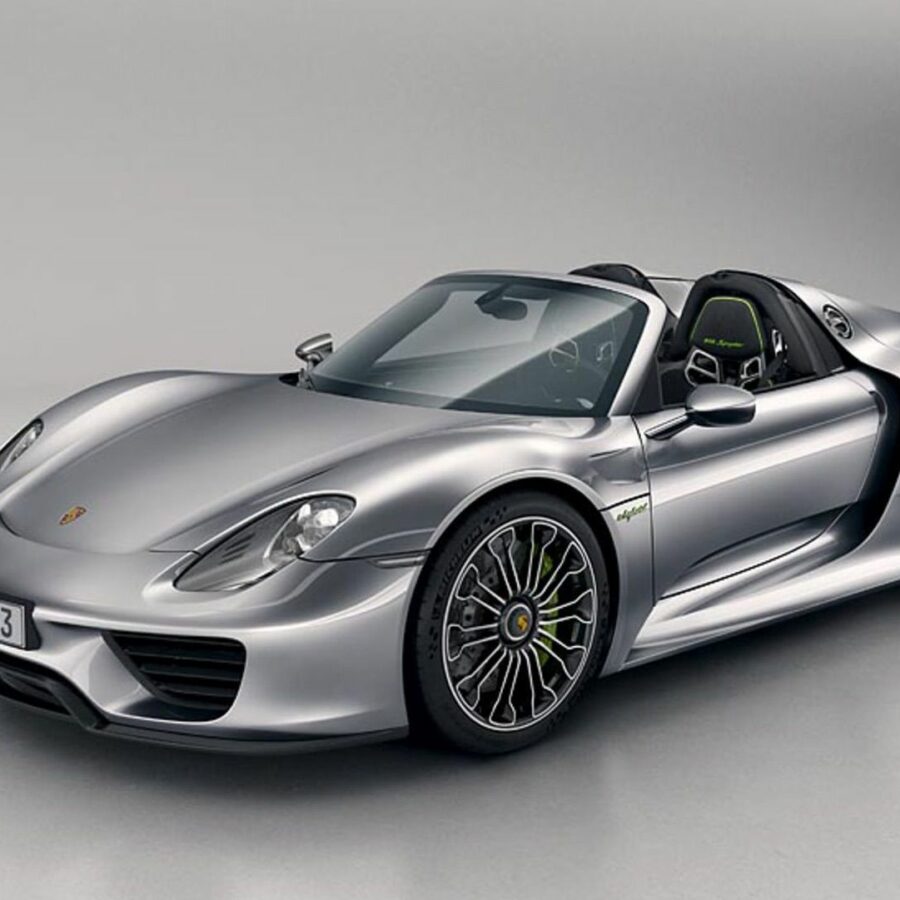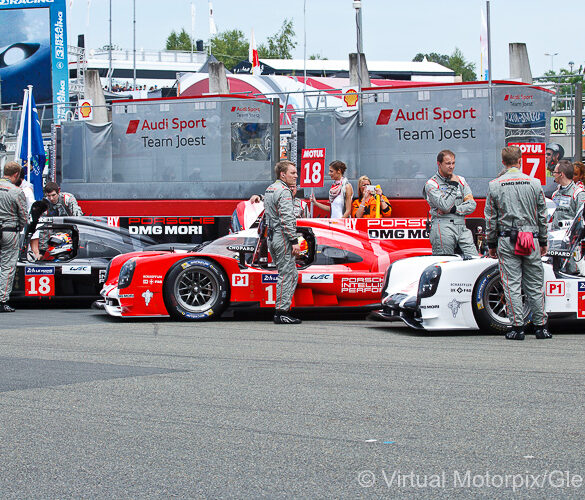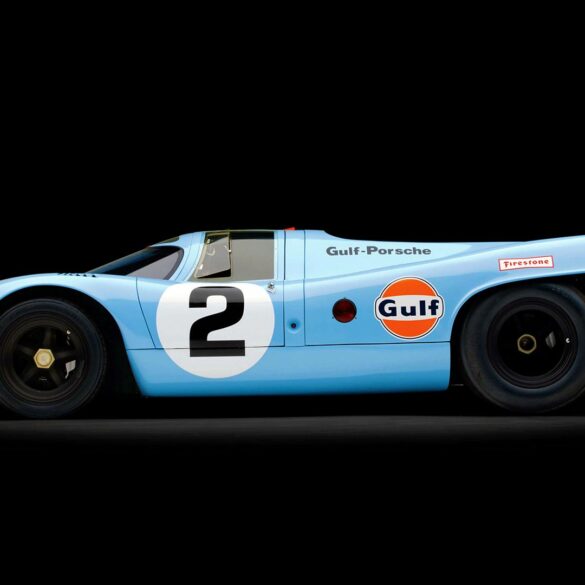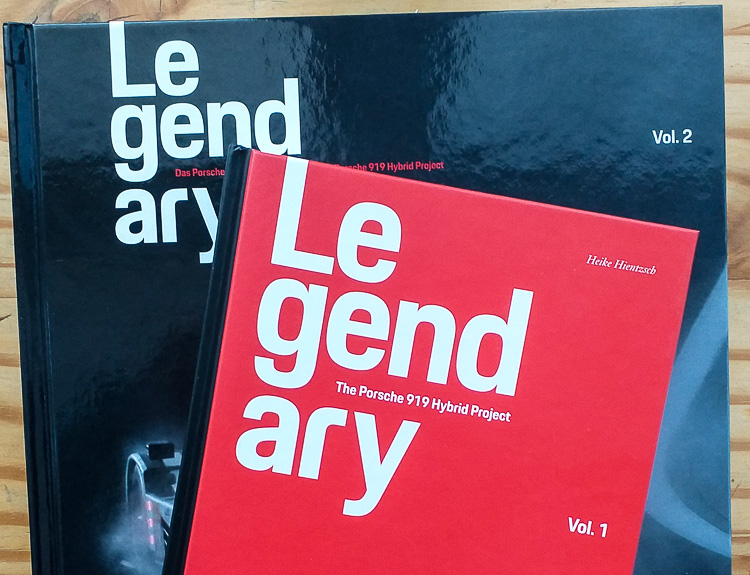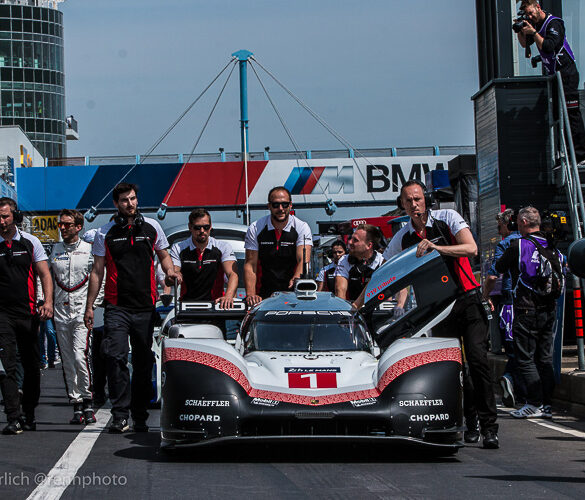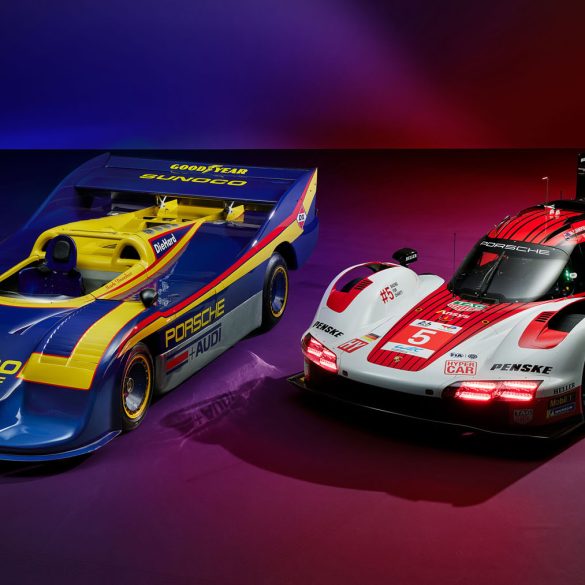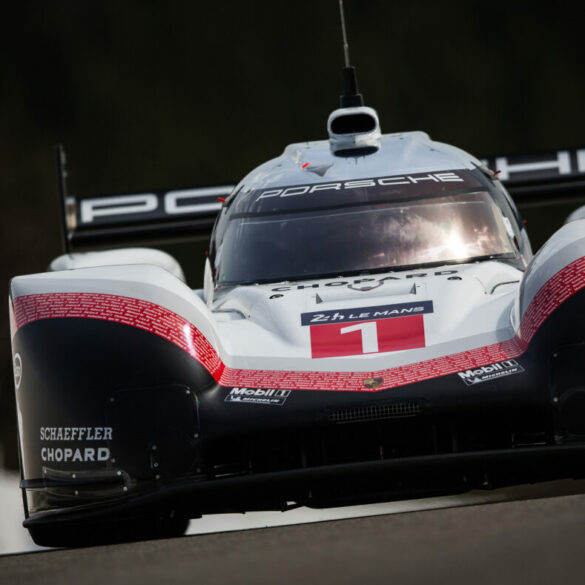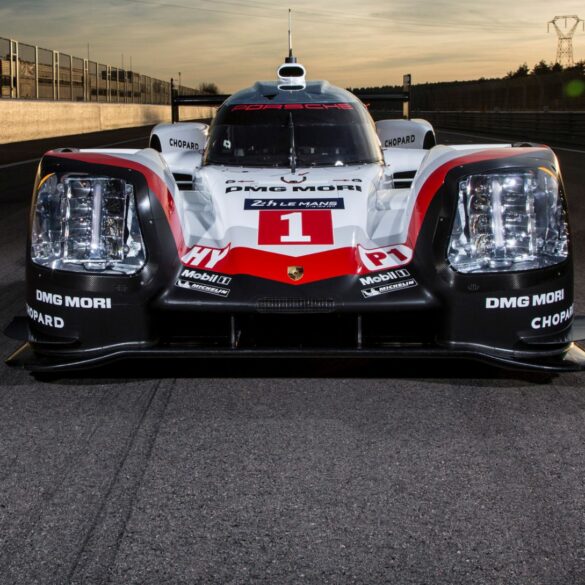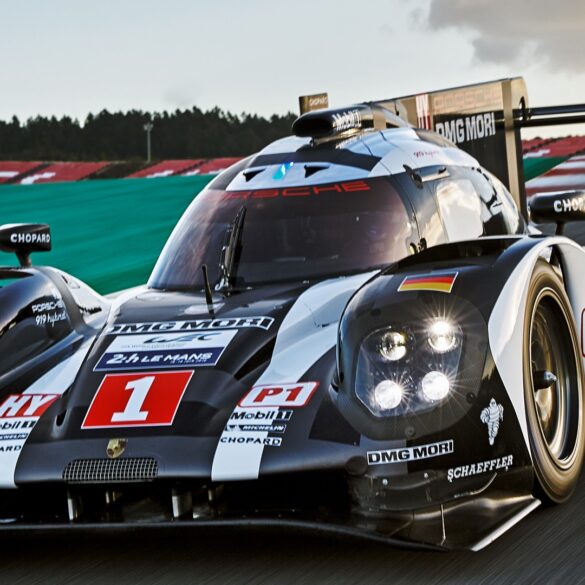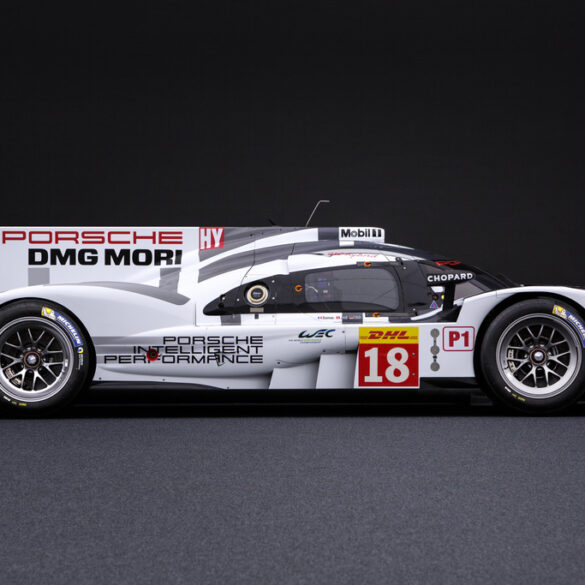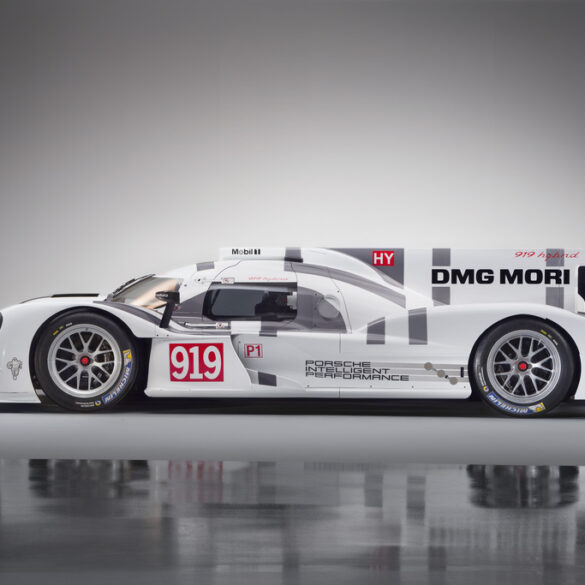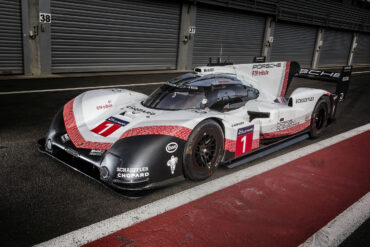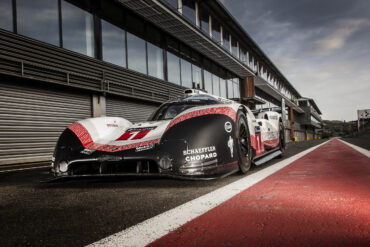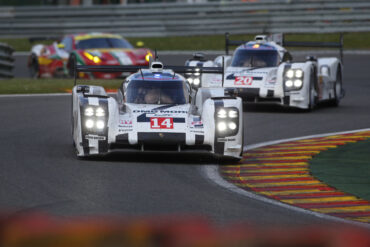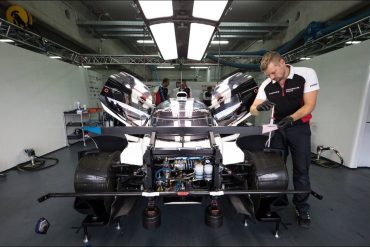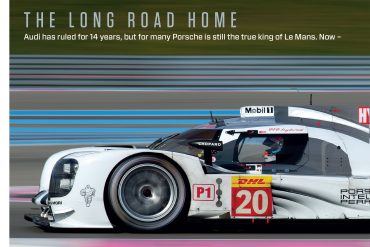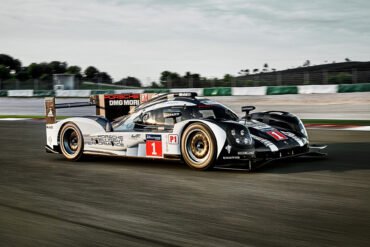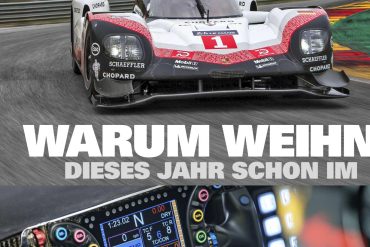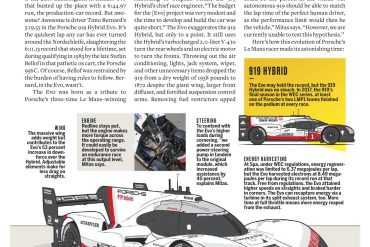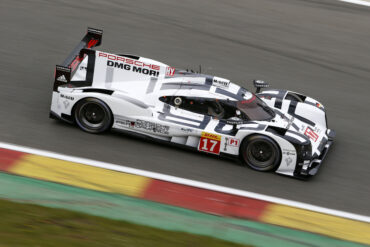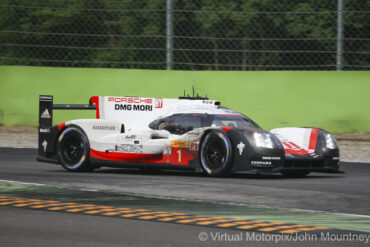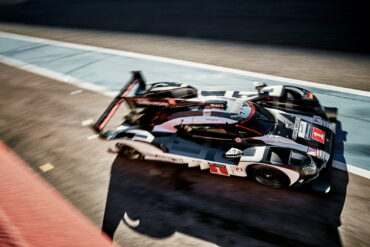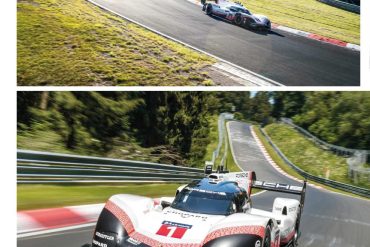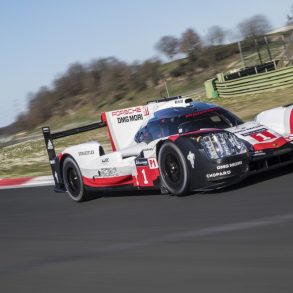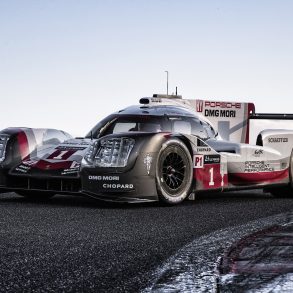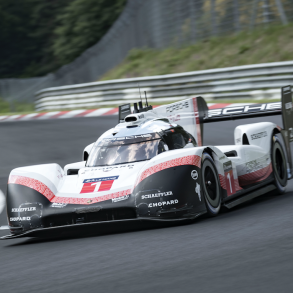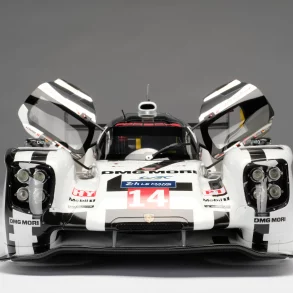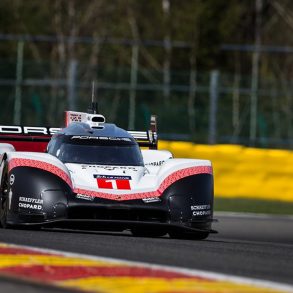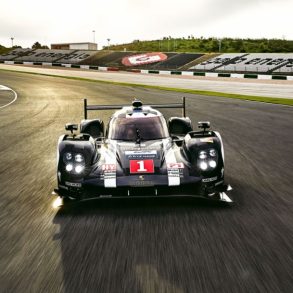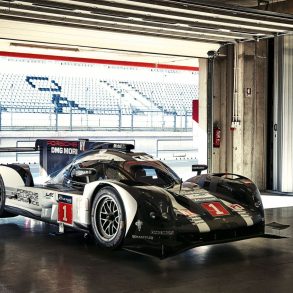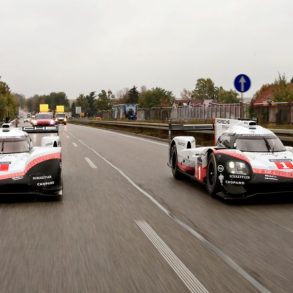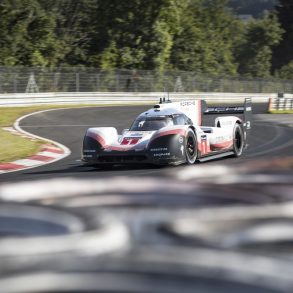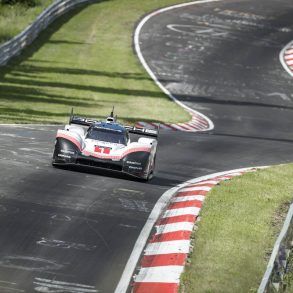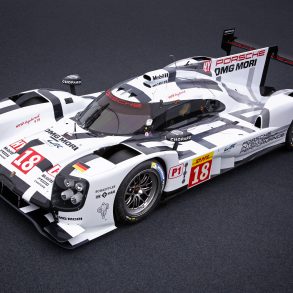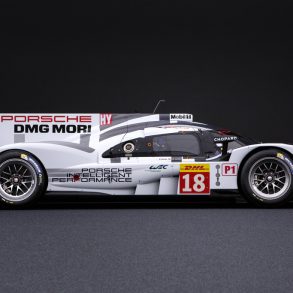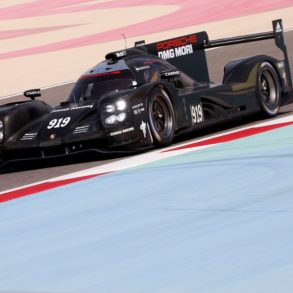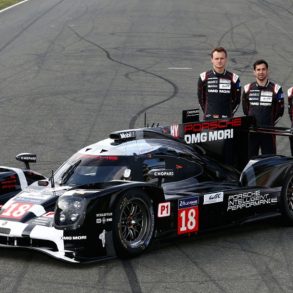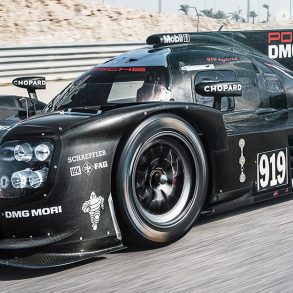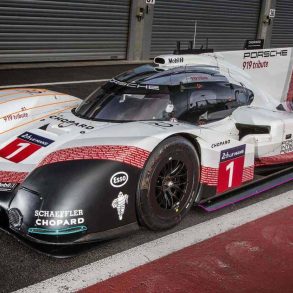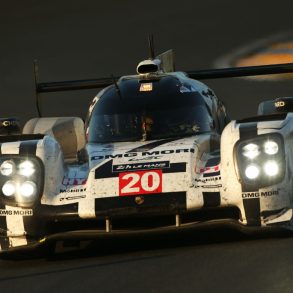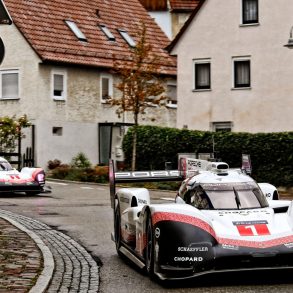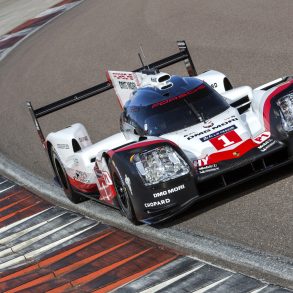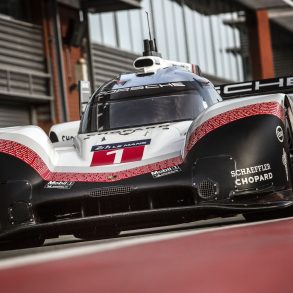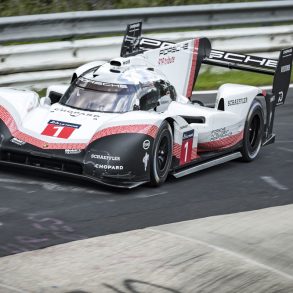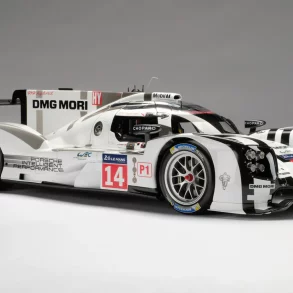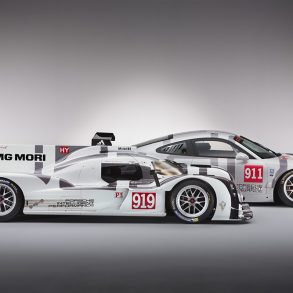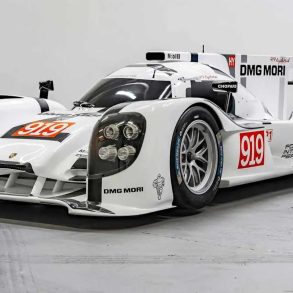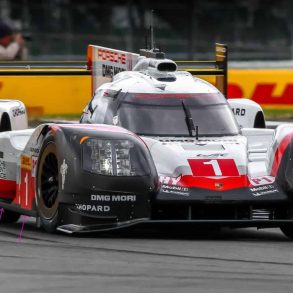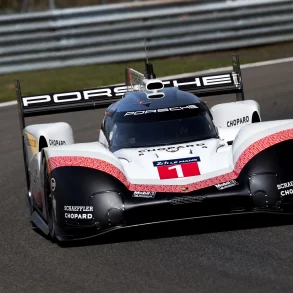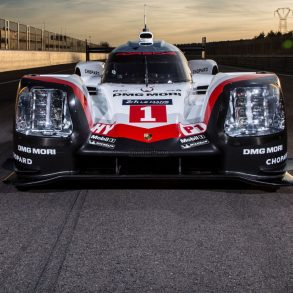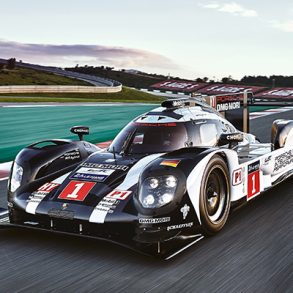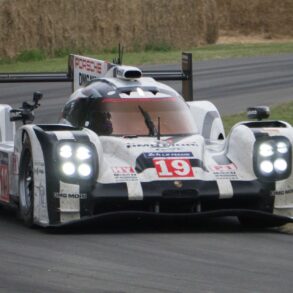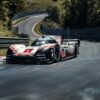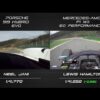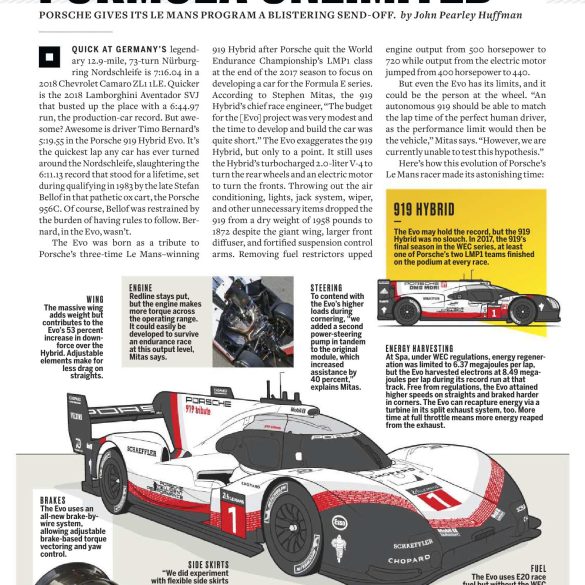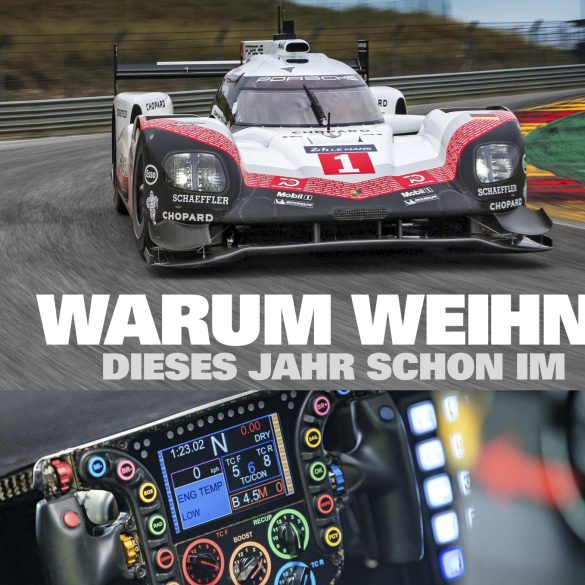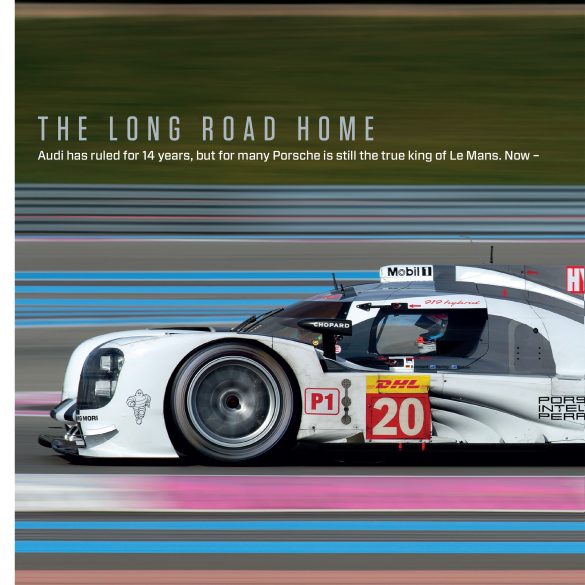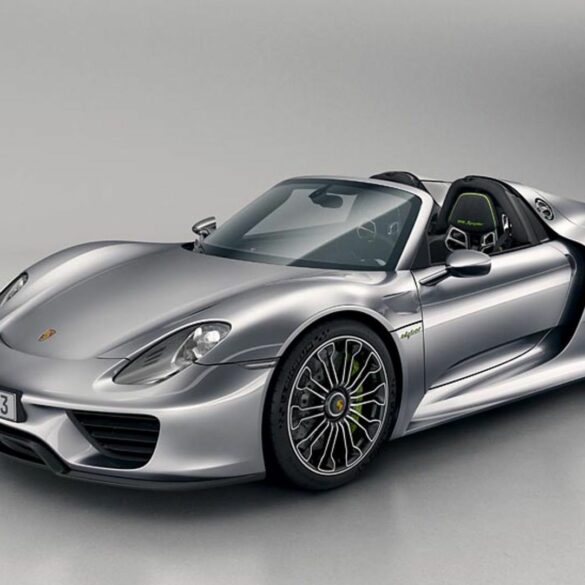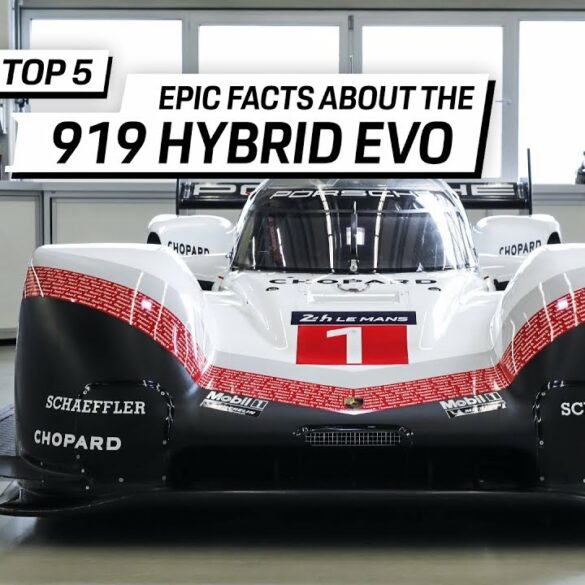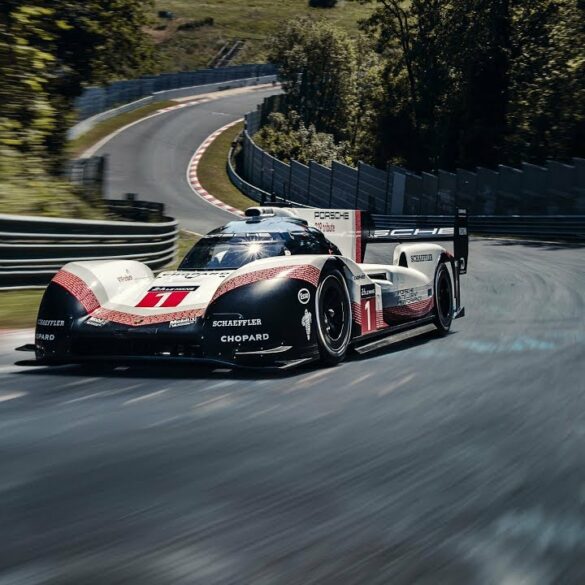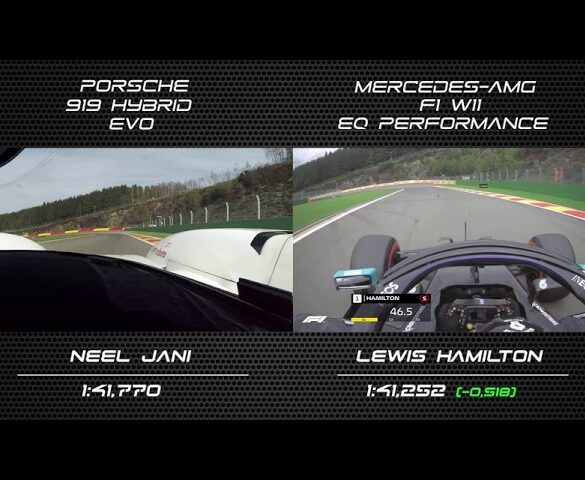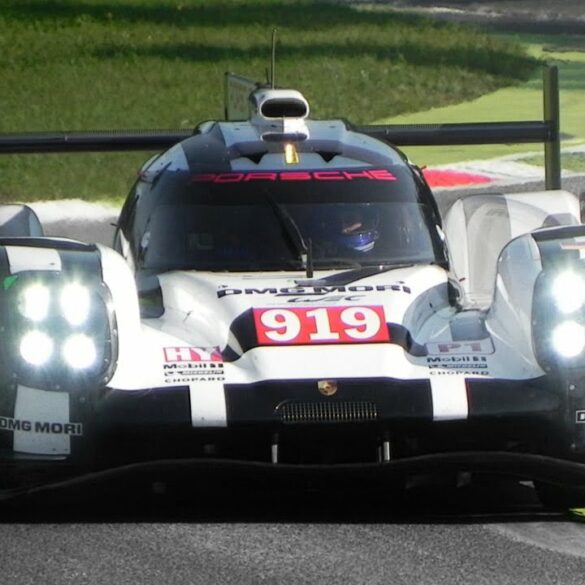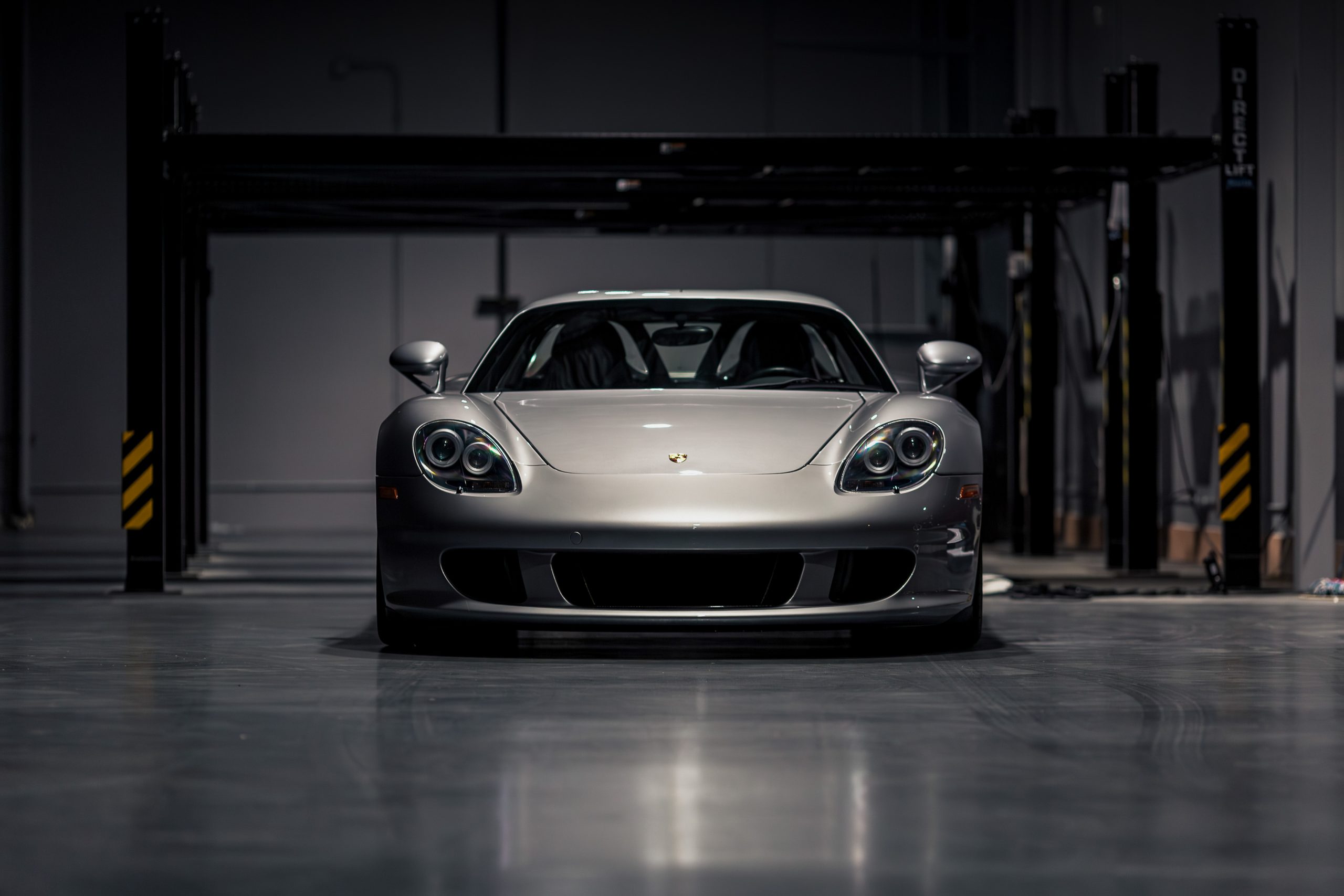Porsche 919 - The Ultimate Guide
Futuristic & Redefined Endurance Racing Dominance.
Model Guides / Featured Stories / Specs / Results / Pictures & Videos / Data & Research / FAQs / News & Updates
Porsche 919 Basics
Manufacturer: Porsche AG
Production Years: 2014 - 2018
Chassis: Composite of carbon fibre with honeycomb aluminium core
Suspension: Independent multi-link pushrod configuration with adjustable shock absorbers
Body: 2-door coupe
Layout: Rear mid-engine
Engines: Porsche 2.0 L (122 cu in) direct-injected turbocharged V4 engine with lithium-ion battery for energy recovery in mid-mounted longitudinal with 4WD system
Transmission: Porsche 7-speed electro-hydraulic sequential gearbox with rear-lock differential
Predecessor: Porsche RS Spyder
Successor: Porsche 963
The Porsche 919 Hybrid is a Le Mans Prototype 1 (LMP1) racing car built and used by Porsche in the 2014, 2015, 2016 and 2017 seasons of the FIA World Endurance Championship.
It has a two-litre (120 cu in) 90-degree V4 mid-mounted mono-turbocharged petrol engine that produces 500 hp (370 kW) and acts as a chassis load-bearing member - and two separate energy-recovery hybrid systems to recover thermal energy from exhaust gases and convert kinetic energy into electrical energy under braking for storage into lithium-ion battery packs.
In accordance with the 2014 regulations, the vehicle was placed in the 6 MJ (1.7 kWh) class. The turbocharged, 2.0-litre V4 engine is small in stature but big on power. In WEC-spec it pumped out 500bhp - add in the power from the hybrid system and the 919 delivered well over 900bhp in race spec, with the engine powering the rear wheels and electric motors deploying energy to the front wheels for some serious four-wheel drive traction.
Porsche was also the only LMP1 manufacturer to recover energy from a small turbine in the exhaust system (separate to the turbo). This way, the car was also able to charge its lithium-ion battery under acceleration as well as braking - just like in an F1 car.
The Porsche 919 Hybrid was competitive from day one and went on to help Porsche win the World Championship in 2015, 2016 and 2017.
Porsche 919 Specifications & Performance
Below we have outlined a basic overview of some key specifications for the Porsche 919 variants over its racing life. Note that several horsepower numbers are marked with an * because no official data was made available. Porsche gave users a guide, but not actuals. In these cases the numbers are estimations made by the Stuttcars.com team.
Porsche 919 Race Results
Porsche supplied two cars, driven by six drivers, for the 2014 season. Romain Dumas, Neel Jani and Marc Lieb won three pole positions and the season-ending 6 Hours of São Paulo as Timo Bernhard, Brendon Hartley and Mark Webber helped the team to finish third in the World Manufacturers' Championship. Bernhard, Hartley, and Webber won four out of eight races to claim the 2015 World Endurance Drivers' Championship and the World Championship. Earl Bamber, Nico Hülkenberg and Nick Tandy won the 6 Hours of Spa-Francorchamps and 24 Hours of Le Mans, driving a third 919 Hybrid. In 2016 Dumas, Jani, and Lieb won the 6 Hours of Silverstone and the 24 Hours of Le Mans with the car after further development. Consistent performances from the trio won them the 2016 World Endurance Drivers' Championship and the team's second. Although Bernhard, Hartley, and Webber had reliability issues in the season's first three races, the trio won four of the six remaining rounds to help Porsche win its second consecutive World Manufacturers' Championship. The next year, 2017, Tandy and former Audi LMP1 driver André Lotterer joined Jani in place of Dumas and Lieb, and Bamber teamed up with Bernhard and Hartley, replacing the retired Webber. Porsche finished on the podium in the first two rounds. Bamber, Bernhard, and Hartley recovered from a 13-lap deficit to win the 24 Hours of Le Mans and three more races for Porsche's third consecutive World Drivers' and Manufacturers' Championships at the season's penultimate round, the 2017 6 Hours of Shanghai. After 2017, the 919 Hybrid project was discontinued to allow Porsche to enter Formula E.
Porsche 919 Season Results
While the 2014 season was a learning one for Porsche, the team still managed to finish third in the World Manufacturers' Championship. In the following three seasons (2015, 2016 and 2017), Porsche came home with the World Manufacturers' Championship three years straight. A dominant performance by the Porsche 919 Hybrid.
Porsche 919 Data & Research
We dig into some of the data surrounding the Porsche 919, including production numbers, specifications, chassis numbers and much more. Unfortunately, Porsche can be a little tight-lipped about sharing technical and performance details of its top-class competitive cars, so this area is a little light.
Porsche 919 Pictures, Galleries & Wallpapers
The Porsche 919 is all about technology and performance driving design. It will never be described as sexy, but this car is a technical masterpiece and the details in the Porsche 919 picture galleries shows you just how those details can be beautiful and purposeful.
Porsche 919 Hybrid Videos
Experience the Porsche 919 in these engaging and fun videos. From recording breaking Nordschleife runs to technical videos and even a video with Chris Harris behind the wheel. Hours of 919 entertainment for you.
Porsche 919 Hybrid FAQs
Find answers to the most frequently asked questions about the dominant Porsche 919, covering its history, specifications, racing legacy, stories and more.
What is the horsepower of the Porsche 919 Evo?
The Porsche 919 Hybrid Evo, the unrestricted evolution of Porsche’s Le Mans–winning 919 Hybrid, produces a combined output of around 1,160 horsepower.
Here’s how it breaks down:
Internal combustion engine (ICE): A 2.0-liter turbocharged V4 engine produces approximately 720 hp.
Electric motor (hybrid system): The front-axle electric motor adds an additional 440 hp, powered by a sophisticated energy recovery system (harvesting energy from braking and exhaust heat).
Unlike the original 919 Hybrid, the Evo was freed from FIA regulations, allowing Porsche to optimize aerodynamics, increase downforce, and remove weight limits. The result was a car that shattered records, including a new lap record at the Nürburgring Nordschleife in 2018, with a time of 5:19.546—making it the fastest car to ever lap the legendary circuit.
Explain how the Porsche 919 Hybrid system worked?
The Porsche 919 Hybrid was a groundbreaking endurance race car that used a highly sophisticated hybrid powertrain, combining traditional internal combustion with advanced electric propulsion and energy recovery systems. Designed to compete in the FIA World Endurance Championship (WEC) under the LMP1-H regulations, its system was all about efficiency, power delivery, and strategic energy deployment. Here's how it worked:
1. Internal Combustion Engine (ICE) – Rear-Wheel Drive
At the heart of the 919 Hybrid was a 2.0-liter turbocharged V4 engine, mounted mid-rear.
It powered the rear wheels and produced around 500–550 horsepower in race trim.
Lightweight and compact, this engine was highly thermally efficient, optimized for endurance racing and fuel flow-limited regulations.
2. Electric Motor – Front-Wheel Drive
Complementing the V4 was a front-mounted electric motor, delivering power to the front wheels, effectively making the 919 an all-wheel-drive car under acceleration.
The electric motor added approximately 400 horsepower.
It was deployed for instant torque during acceleration and overtaking, especially effective when exiting corners.
3. Energy Recovery Systems (ERS)
The real magic of the 919 Hybrid came from its two advanced energy recovery systems:
MGU-K (Motor Generator Unit – Kinetic): Captured kinetic energy during braking at the front axle, similar to regenerative braking in electric vehicles.
MGU-H (Motor Generator Unit – Heat): Recovered thermal energy from the exhaust gases via a turbine system—an incredibly complex and rare technology in motorsport.
Both systems stored recovered energy in a liquid-cooled lithium-ion battery pack, which could then rapidly discharge power to the electric motor on demand.
4. Energy Management Strategy
Under WEC rules, hybrid systems were regulated by an energy allocation class (e.g., 6MJ, 8MJ per lap at Le Mans), so Porsche had to design software and strategy to maximize performance while staying within limits. The system constantly balanced:
When to deploy electric boost
When to harvest braking and exhaust energy
When to rely on the V4 engine alone
What happened to the Porsche 919?
After dominating endurance racing for several years, the Porsche 919 Hybrid was officially retired from competition after the 2017 season. Its retirement marked the end of Porsche’s incredibly successful run in the FIA World Endurance Championship (WEC) in the LMP1-H category, where the 919 had become a symbol of hybrid innovation and racing excellence.
Racing Success (2014–2017)
From 2014 to 2017, the Porsche 919 Hybrid secured:
3 consecutive Le Mans 24 Hours wins (2015, 2016, 2017)
3 WEC Manufacturers’ Championships (2015, 2016, 2017)
Dozens of pole positions, podiums, and race wins
It was Porsche's first return to top-tier endurance racing since the 1998 Le Mans win with the GT1, and the 919 quickly became a benchmark for hybrid racing technology.
Post-Retirement: The 919 Evo
Following its retirement from competition, Porsche transformed one of the 919s into the 919 Hybrid Evo, an unrestricted, record-breaking version that demonstrated the car’s full performance potential without FIA regulations.
In 2018, the 919 Evo smashed the all-time lap record at the Nürburgring Nordschleife with a time of 5:19.546, driven by Timo Bernhard—obliterating the previous record set in 1983.
It also broke lap records at Spa-Francorchamps and took part in a “Tribute Tour,” showcasing Porsche’s hybrid innovation around the world.
Where Is It Now?
Several examples of the 919 Hybrid, including the Evo, have been preserved by Porsche:
Displayed in museums, like the Porsche Museum in Stuttgart
Used for heritage events, exhibitions, and VIP demonstrations
Studied internally for technology transfer to road-going cars (e.g., the Taycan and future electric models)
What is the fastest Porsche 919?
The fastest Porsche 919 is the Porsche 919 Hybrid Evo, an unrestricted evolution of the Le Mans–winning 919 Hybrid. Freed from the FIA’s racing regulations, the 919 Evo was optimized purely for performance—and it became the fastest Porsche ever built for a circuit.
Key Performance Specs of the 919 Evo:
Total Power Output: ~1,160 horsepower 720 hp from the 2.0L turbocharged V4 engine 440 hp from the front-axle electric motor
Weight: ~849 kg (1,871 lbs)
Top Speed: Over 225 mph (362 km/h)
Downforce: 50% more than the Le Mans-spec 919 Hybrid
Lap Record at Nürburgring Nordschleife: 5:19.546, set by Timo Bernhard in 2018 — the fastest lap ever at Nürburgring
The 919 Evo was a technological masterpiece—featuring active aerodynamics, optimized energy deployment, and an insane power-to-weight ratio. It was never raced competitively but served as Porsche’s way of demonstrating what the car could do without the constraints of fuel flow limits, hybrid deployment caps, or weight minimums. In essence, the Porsche 919 Hybrid Evo is the fastest, most extreme Porsche ever to hit the track—a tribute to engineering without compromise.
Was the Porsche 919 faster than a Formula One car?
Yes—under certain conditions, the Porsche 919 Hybrid Evo was faster than a Formula One car, particularly in terms of lap times on high-speed circuits. While it’s important to note that direct comparisons are complex due to differences in regulations, weight, tires, and power delivery, the 919 Evo demonstrated pace that rivaled or even exceeded F1 performance in specific scenarios.
In 2018, the 919 Hybrid Evo set a mind-blowing lap time of 5:19.546 at the Nürburgring Nordschleife, shattering the previous record by over 50 seconds. No Formula One car has ever officially attempted or set a lap time on the full Nordschleife in modern times due to safety concerns, but experts agree that no current F1 car could match that time on that track.
At Spa-Francorchamps, the 919 Evo clocked a lap time of 1:41.770, faster than Lewis Hamilton’s 2017 F1 pole time of 1:42.553 in the Mercedes-AMG F1 W08—proving it could outrun F1 cars on certain tracks in ideal conditions.
The bottom line is that the Porsche 919 Evo wasn’t bound by F1 or WEC rules. It was a one-off engineering exercise designed to push the absolute limits of performance. While it didn’t race head-to-head with Formula One cars, in terms of lap time potential, it was absolutely in the same league—and in some cases, even faster.
What kind of racing success did the Porsche 919 have?
The Porsche 919 Hybrid enjoyed extraordinary racing success during its competitive life from 2014 to 2017, firmly establishing itself as one of the most dominant endurance race cars of the modern era. Competing in the FIA World Endurance Championship (WEC) in the top-tier LMP1-H category, the 919 delivered Porsche a new era of hybrid-powered triumphs at the world’s toughest tracks.
Key Achievements of the Porsche 919 Hybrid:
3 Consecutive Le Mans Wins (2015–2017): In 2015 Porsche scored its first Le Mans 24 Hours victory since 1998, with the 919 driven by Nico Hülkenberg, Earl Bamber, and Nick Tandy. In 2016, the 919 took a dramatic win after Toyota's heartbreaking last-lap breakdown, securing back-to-back glory. In 2017, in a grueling, attrition-heavy race, the 919 again emerged victorious, completing a historic hat trick.
3 World Championships (2015–2017): Porsche won the FIA World Endurance Manufacturers' Championship three years in a row, showcasing the 919’s consistency, reliability, and dominance across diverse tracks and conditions.
17 Race Wins & Numerous Podiums: Across its four-year career, the Porsche 919 Hybrid claimed 17 overall victories, including at legendary circuits like Spa-Francorchamps, Silverstone, Bahrain, Fuji, and Nürburgring. The car consistently challenged and outperformed rivals from Audi and Toyota, who had set the pace in the hybrid era until Porsche’s return.
Join Our Porsche Community
Sign up for our weekly Porsche newsletter. The latest Porsche news, rumors, reviews and more delivered to your inbox. Cool Porsche stuff perfect for the flat-six obsessed.


